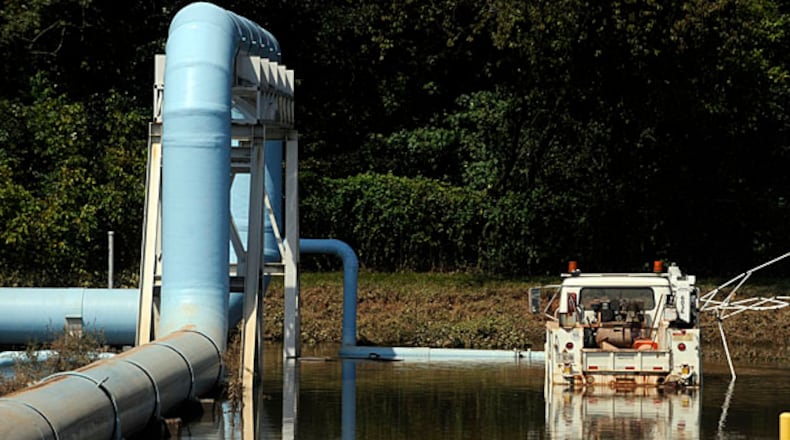Release of inadequately treated wastewater has sent levels of dangerous E. coli bacteria in the Chattahoochee River skyrocketing downstream from Atlanta’s R.M. Clayton Water Reclamation Center, according to Jason Ulseth, executive director of the Chattahoochee Riverkeeper.
The environmental organization urges people to stay out of the river downstream of the Chattahoochee River National Recreation Area. Water recreation should still be safe upstream of the plant, Ulseth said.
“Some level of treatment is happening, but not to any sufficient level to protect public health downstream of the plant for many, many miles,” he said Thursday afternoon. “This is a really big deal and it poses a significant health hazard to anybody coming in contact with the river.
“People need to know that they should avoid river contact until this plant is back online and fully operational.”
There has not been an actual sewage spill, and the Clayton plant is “operational and online,” according to a spokesperson for the Atlanta Department of Watershed Management.
High water flow from heavy rain caused mechanical failures at the plant, so DWM is doing “corrective and preventive maintenance” on several secondary clarifiers, the spokesperson said. Those remove additional pollutants that got through the primary treatment.
Eight mobile clarifiers have been added during the repairs, and more disinfectant is being used to lower E. coli levels, according to the spokesperson.
Guidelines from the U.S. Environmental Protection Agency say E. coli concentrations below 126 units per 100 milliliters of water are safe for swimming and other recreation. Ulseth said that while it appears the plant’s treatment processes are removing larger solids, the Riverkeeper has found concentrations of the fecal bacteria around the facility’s outfall that are north of 120,000 units per 100 milliliters.
“As of March 13, there have been no indications of a fish kill as a result of the discharge,” a Chattahoochee Riverkeeper announcement said. “Drinking water in Fulton County and the metro Atlanta region is not affected by the plant failure.”
The group discovered the contamination in routine daily samples collected downstream from the Marietta Boulevard/Atlanta Road bridge between March 4 and March 13, and reported it to the Georgia Environmental Protection Division.
The DWM does “ongoing monitoring and sampling,” and collaborates with Georgia EPD to deal with elevated E. coli levels, the DWM spokesperson said. The Georgia EPD did not respond immediately to a request for comment Thursday.
The Clayton plant at 2440 Bolton Road NW treats Atlanta’s sewage. It is permitted to release up to 100 million gallons of treated wastewater per day into the river. The city’s water treatment system is separate from Fulton County’s.
“Compliance is a top priority for the department, and we are working with our regulatory agency on this matter,” the Atlanta DWM spokesperson said. “These maintenance efforts signify DWM’s commitment to ensuring optimal treatment performance and infrastructure reliability.”
Sara Lips, a spokeswoman for the Georgia Environmental Protection Division (EPD), said the agency is aware of the situation and is investigating.
“We are currently coordinating with the City (of Atlanta) to ensure that mitigation measures are appropriately implemented,” Lips added.
The Riverkeeper group noted that this is not the first E. coli contamination the Chattahoochee has seen recently. Last year a breakdown at Fulton County’s Big Creek Water Reclamation Facility released “more than 20 million gallons of undertreated sewage” into the river just upstream of the Chattahoochee River National Recreation Area, the group said.
Eleven miles of the river were closed to recreation for three weeks. The spill was caused by toxic chemicals which killed most of the “good bacteria” used to treat wastewater. A new batch had to be brought in from the Johns Creek Environmental Campus. In the meantime the county diverted several million gallons per day to DeKalb County’s water treatment plant.
Riverkeepers discovered that leak too, thanks to testing at Morgan Falls near Sandy Springs in late June.
“Local governments need to make sure they have a firm handle on their operations and maintenance to ensure that these situations don’t happen,” Ulseth said.
Staff writer Drew Kann contributed to this report.
About the Author
Keep Reading
The Latest
Featured




